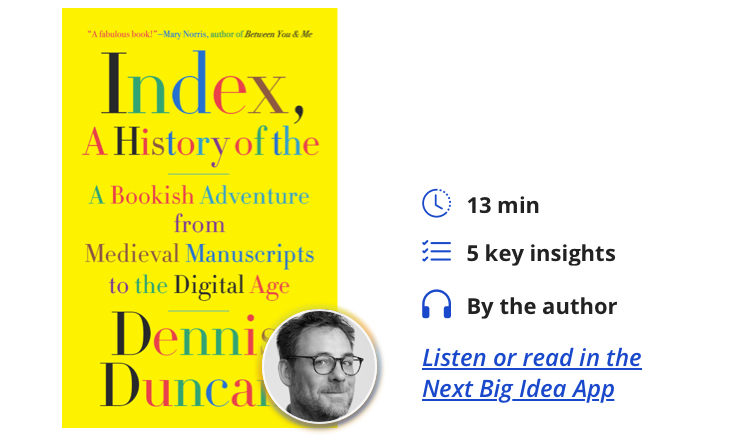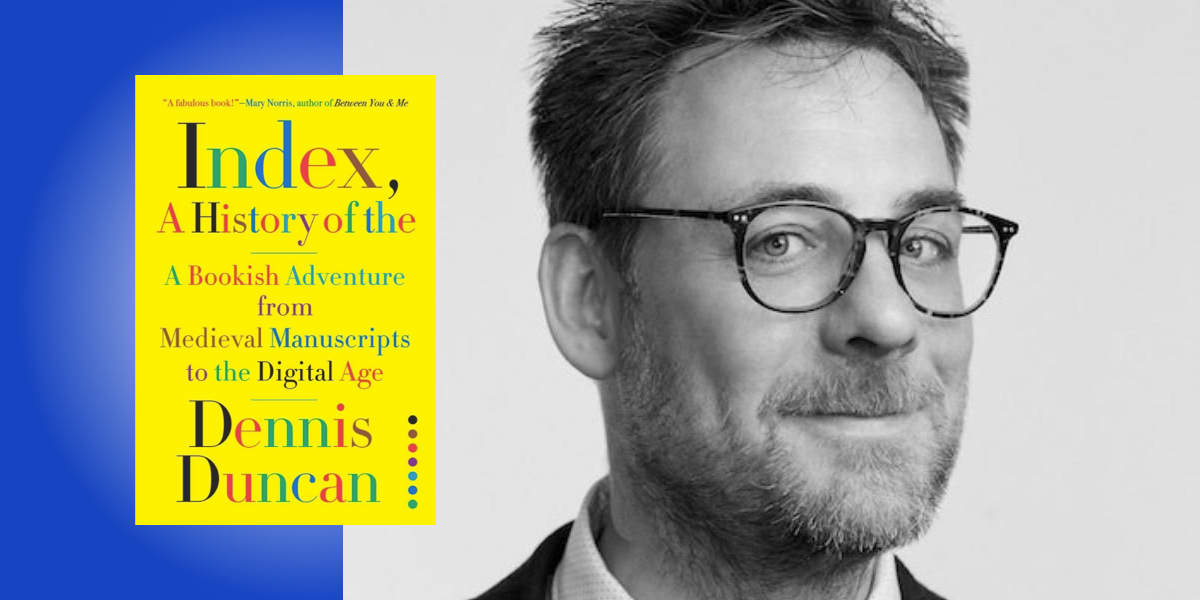Dennis Duncan is a writer, translator, and lecturer in English at University College London. He has published numerous academic books, including Book Parts, The Oulipo, and Modern Thought, as well as translations of Michel Foucault, Boris Vian, and Alfred Jarry. His writing has appeared in the Guardian, the Times Literary Supplement, and the London Review of Books. Recent articles have considered Mallarmé and jugs, James Joyce and pornography, and the history of Times New Roman.
Below, Dennis shares 5 key insights from his new book, Index, A History of the: A Bookish Adventure from Medieval Manuscripts to the Digital Age. Listen to the audio version—read by Dennis himself—in the Next Big Idea App.

1. Google is an index.
It took me seven years to research the history of the index, and I often got the reaction of, “Um, isn’t that a bit niche?” The best response is, “Well, when did you last use a search engine? Or a hashtag? Or hit Ctrl+F to jump through a document?”
We live in the Age of Search. Our phones, tablets, and laptops open a bottomless well of information from which we can draw freely. As we talk, read, or watch TV, our fingers twitch restlessly over our devices, ready to answer any question that comes to mind.
But as one of Google’s engineers, Matt Cutts, puts it, “The first thing to understand is that when you do a Google search, you aren’t actually searching the web. You’re searching Google’s index of the web.” The history of the index is the history of how we ended up here. The technology that underpins our information age can be traced back to the Middle Ages.
Indexes (always indexes, not indices) are one of those inventions that are so successful, so integrated into our daily practices, that they often become invisible. But the next time you look something up—whether on your phone or at the back of a book—remember that you are using a tool invented by monks in the 13th century, which they used to bring about their own Age of Search by speeding up access to information.
2. Are we all on the same page?
Researching indexes meant lots of time in the company of medieval manuscripts. These are books, but they are all written out by hand. That’s what manuscript means: hand-written. Before the printing press was invented in the 1450s, every single book had to be written out by hand. If you wanted a copy of a book, then it really was a copy: you would have to pay someone to copy it out. It was very expensive, and it would take months. And while the person copying it would try very hard to make sure they copied the text accurately, they would not pay any attention to whether things stayed on the same page as the original. After all, they might be copying from a big-sized book to a small one, or vice versa. So page numbers in the Middle Ages are not very useful, since they only work for one particular copy of a book.
“The technology that underpins our information age can be traced back to the Middle Ages.”
A few years ago, I was looking at a manuscript in the library of St. John’s College, Cambridge. It was a history book from the 1380s that had been copied out by a monk named John Lutton. (He signed his name at the end, bless him. Copyists often did this, a bit like an artist signing a painting. After all, they’d spent literally months working on it.) At the end of this history book is an index, and poor old John Lutton didn’t get how this worked because he copied out the index with exactly the same page numbers as the book he was copying from. The whole index is like a webpage where every link takes you to a 404 PAGE NOT FOUND error.
But the problem disappears overnight when printing comes along. Now, as long as your book and my book came from the same print run, we can be on the same page, as the phrase goes. We can share references, use footnote citations to back up our work, create an index for any book (not just the Bible with its chapter divisions), and know that it works across the whole edition. All of this was just a few decades too late for poor old John Lutton.
If you think about the present, about reading a webpage, like a long story on a news site where the text scrolls down for as long as it takes, or reading on a Kindle where you can make the font large or small, changing the amount of text on the page, then we are back with the medieval problem that John Lutton faced. The page is no longer a stable unit; we are going to need different locators if we want to index these.
3. There are many different ways of reading.
I described our present moment as the Age of Search, but you might have heard it described as the Age of Distraction. In 2008, a writer named Nicholas Carr wrote an influential article that asks if Google is making us stupid—but this isn’t a new idea.
Ever since the index was invented, it has had critics: people anxious that searching is replacing reading, that slow, patient, linear reading is being driven out by the ability to instantly find the bit we’re looking for. In 1532, the great intellectual Erasmus of Rotterdam published a book which took the form of an index, and he wrote in the preface that, “I had to do this because these days this is the only part of a book that people read.” 200 years later, the Irish writer Jonathan Swift (author of Gulliver’s Travels) wrote of “the men who pretend to understand a book by scouting through the index, as if a traveller should go about to describe a palace, when he had seen nothing but the privy.”
“People have been complaining about indexes for 500 years, and yet we do still read books. That is literally why I am telling you about my book.”
So, people have been complaining about indexes for 500 years, and yet we do still read books. That is literally why I am telling you about my book—the doomsayers have not yet been proved right.
This is because they misunderstand the word “reading.” There is no one type of reading. The idea that “nobody reads properly anymore” is a misrecognition. Are you doing the same thing when you read a novel as when you read a newspaper? What about an email, restaurant menu, railway timetable, or tweet? All of these are reading, but all of them are different activities, which bring with them different economies of attention. They each have different histories, cthey ome into being at different points to service different needs, and we perform many of them in a single day. Doing one doesn’t mean that we can no longer do another, so don’t be afraid of index-learning. Using an index—in any format—is only one way to read.
4. New technologies are liable to be subverted.
You might think that indexes are a very dry thing, or at least sensible, serious, and responsible. I won’t tell you that this isn’t true for the most part, but like any piece of technology, once everybody learns how to use it, some people start to customize it, find uses that it wasn’t originally designed for, and have fun with it.
Book indexes have a very recognizable syntax: short, pithy, backwards. This lends itself to humor, since after all, as Polonius says in Hamlet, “Brevity is the soul of wit.” So, we find people using the back-of-the-book to bury perfectly formed snark. There is the disgraced British politician, for example, who turns up in a book index as follows: “Aitken, Jonathan, admires risktakers 59, goes to jail, 60.” Or the historian Hugh Trevor-Roper who takes a swipe at his colleagues at Cambridge College in an index entry: “Peterhouse [College]: high-table conversation not very agreeable, 46; main source of perverts, 113.”
“It became a fashion to publish rogue indexes to one’s rivals’ books, pointing out all their moments of pompousness or poppishness or simply bad grammar.”
The index first became weaponized as a satirical tool around the turn of the 18th century. The first example was in a book attacking a scholar named Richard Bentley. The index lists all of the unpleasant aspects of Bentley’s character: “his egregious dullness,” “his pedantry,” “his familiarity with books he never saw,” and so on. Before long, it became a fashion to publish rogue indexes to one’s rivals’ books, pointing out all their moments of pompousness or poppishness or simply bad grammar. (If you think public swearing was invented in the 1960s, think again.)
So, do we find the index being subverted and amusingly misused in the digital age? Of course we do. Just type “askew” into Google to see the playfulness that has been deliberately coded in there. The search engine doesn’t do exactly what you expect.
5. Humans still make better indexers.
The kind of snark that I’ve described is the stuff of human relationships: one person’s takedown of another. It reminds us that a good book index, whether or not it is witty, still requires a good indexer—meaning, an expert reader who anticipates the things we will want to look up. The good indexer knows that it can be helpful to tag a concept even if it is not explicitly named, so that a passage on Jean-Paul Sartre might warrant an entry under “existentialism,” or that a gardener might look up either the common or botanical name of a plant. A good indexer knows that when a text mentions “the White House,” sometimes it means the building, and sometimes (by metonymy) its occupant. And they can tell the difference—without first names—between Marx, Karl; Marx, Groucho; and Marx, Richard.
My book includes two indexes at the back: one compiled automatically by the latest indexing software, the other by Paula Clarke Bain, a professional indexer from Manchester in England and a member of the Society of Indexers. The difference between them is stark. Paula’s is full of life—its entries sing: “Bentley, Richard, his egregious dullness etc., 148,” “recompense, feeble, for indexers, 207.” It has jokes, anagrams, and crossword clues. In other words, it is imbued with Paula’s personality. The software, by contrast, offers only a vast table of words and phrases, fragments chipped (seemingly arbitrarily) from the text: “amateur, single, 13,” “amused responses, 256.” For all the miraculous advances of digital, universal search tools, there is still a place for the deep reading of the professional book indexer.
To listen to the audio version read by author Dennis Duncan, download the Next Big Idea App today:
































